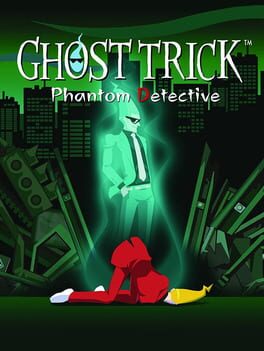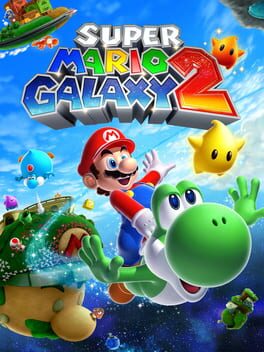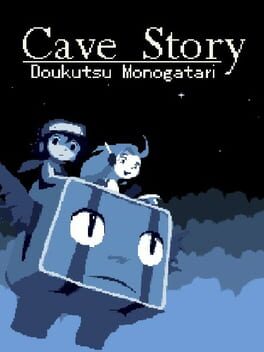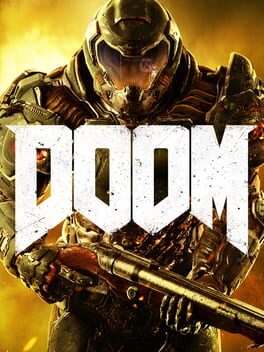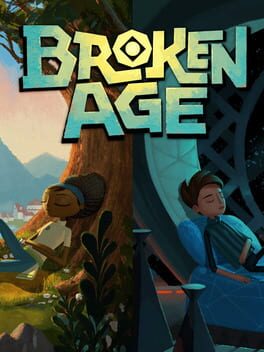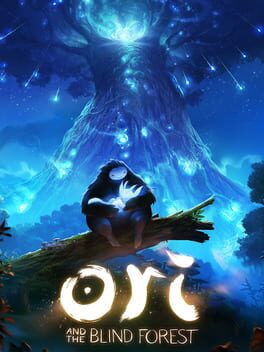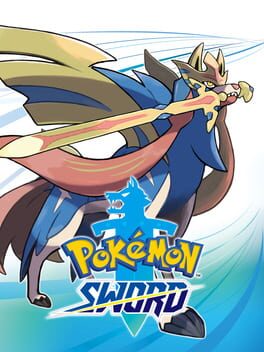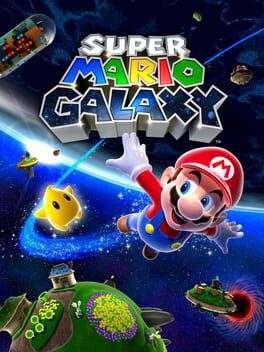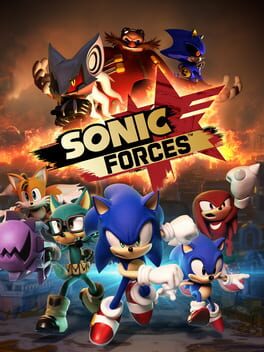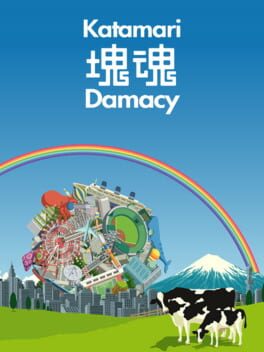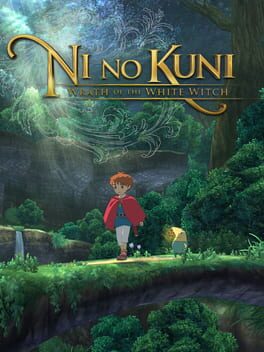chump
Found myself enjoying this a lot less than I hoped I would. Like Shu Takumi's other games, it makes great use of reincorporation and has a really satisfying ending. That being said, I didn't really find the mystery as interesting as the ones in the Ace Attorney games, probably due to how much less grounded the world is. I was also disappointed by the puzzles, which are great conceptually, but I didn't feel satisfied by the solutions to pretty much any of them. The game is worth playing alone though for the fantastic character animations- it has some of the most expressive 3D models I've ever seen, which is unfathomably impressive considering the fact that it's on the DS.
2010
2004
Probably the greatest one-man game of all time. The weapon leveling mechanics are brilliant and it's a real shame that pretty much no other games have tried imitating or expanding on them up to this point. The characters are all presented in such a way that ingrains them into your memory even though none of them are given very much screen time. Despite the poorly handled branching endings, it's also a game that I find myself compelled to replay on a regular basis- its quick pacing, alternate weapon trading paths, and additional modes like Curly Story found in certain versions of the game all contribute to that. The game's music is also a big part of what makes it special. Throughout its wide range from somberness to frantic action, the soundtrack maintains an air of eeriness that perfectly compliments the setting and provokes the player into wanting to learn everything possible about the Mimigas, the floating island, and the main character's history.
2016
It's really impressive how well this game manages to accomplish its only goal: raw, blood-pumping aggression. The glory kills, which are used to give the player mini-rewards for good play, are a particularly genius mechanic. It's really underestimated how valuable a few seconds of being able to catch your breath and think about your next move are while playing as a glass cannon character in a high-speed action game, and the intensely gratifying animations certainly don't hurt. My gripes with this game come from the parts that feel as though they were implemented to bring the game up to speed with modern gaming standards, mainly the upgrade system and the map used for exploration. I understand the idea was to throw in some non-action elements in order to keep the game from becoming too repetitive, but c'mon, it's DOOM- no part of it should require a menu.
2014
Probably would be one of my favorite point-and-clicks if it was a complete story, but it feels like it ends right when it's about to get interesting. The puzzles strike a solid balance between difficulty and rationality, the cast includes Jack Black so is automatically great, and all 2.5 of the locations are imaginative and visually appealing.
Outstanding visuals, audio, and movement mechanics all come together to make backtracking fun, which is about the highest praise you can give to a non-linear platformer. Combat is non-interactive and feels more like an inconvenience than anything, and the story gets pretty intrusive- the world could've been used to speak for itself but the game instead relies on interruptions and cutscenes. Still a pretty magical experience.
2019
The worst mainline Pokemon yet. It's clear that Game Freak had tunnel vision in terms of criticism towards Sun and Moon's copious amount of cutscenes because Sword and Shield has no story. It's really as simple as that- Gen 8 consists entirely of walking into a town, entering the gym, fighting the gym leader, and leaving. There's nothing in Sword and Shield that can't be found in any other game in the series, and therefore no reason to play it. It doesn't even have every Pokemon, which seems like such a joke- what point is there to a new Pokemon game if you can't even catch 'em all?
2007
The first Mario platformer to prioritize presentation over gameplay. Compared to 64 and Sunshine, both movement options and level exploration take a big hit, and when you consider the hardware that the game exists on, it's not hard to see why. I most likely don't need to mention that I'm against casualization, but I probably wouldn't be if every game did it as well as Super Mario Galaxy. The unquestionably phenomenal soundtrack, the visuals that still look great 13 years on, the delightfully extreme ranges in tone from galaxy to galaxy, the grand scale that feels worthy of the outer space setting, and Nintendo's trademark imagination at its very best lead to some of the most fantastical worlds ever seen in a video game, even if the platforming itself isn't fantastic.
2017
Transparently uninspired and lazy. Not the worst Sonic game by any means but its existence makes me angry. I'm not someone who's gonna tell you that the earlier Sonic games were masterpieces but they were clearly products of passion, even the not so great ones, not soulless corporate derivations like this game. The level design is just nothing. Classic Sonic is only in this game to piggyback off of Generations' acclaim. Custom characters only exist to give the game a gimmick and some viral appeal. As usual, the sound team members are the only ones who are trying, Infinite's theme is a banger.
2004
2017
There's not many games out there where you can break down a single seemingly insignificant wall and stumble upon a whole new area of the world. Hollow Knight's exploration is its best feature, but that exploration would be much less impactful if its setting wasn't as compelling as it is. Traversing a lost civilization completely submerged under the earth is a fantastic concept for a non-linear platformer, and Hollow Knight's level layouts, character designs, and artwork all do an excellent job at making Hallownest come to (after) life. The game is also great at piquing the player's curiosity, the best example of this being Hornet. She's the first character in the game who seems to recognize who you are, and pursuing her really makes it seem like you're on the verge of a huge discovery- just need to dig a little deeper.
At this point in time Hollow Knight is largely being considered as the successor to Super Metroid. While I'm not Super Metroid's biggest fan, I feel as though Hollow Knight has several gameplay downgrades compared to it and several other non-linear platformers (not going to use the M-word). Hollow Knight never really gives you a sense of power progression. Even at the end of the game you'll still be using that get one hit in -> get out of an enemy's range combat loop that you've been using since hour one. The mandatory upgrades are also possibly the game's weakest aspect. They range from completely situational (the wall boost that is unlocked at the Crystal Peak comes to mind) to completely predictable staples of the genre (a double jump, an air dash, a wall jump). None of them force the player to view the world from a different perspective in order to determine how they can be used to progress, and none of them really make traversing the world more interesting. This last point in particular stings due to how much backtracking is in the game- most of it doesn't feel justified due to how boring your moveset is.
While I don't consider Hollow Knight to be among my favorite indie games or my favorite non-linear platformers, I'm still very thankful that it exists. It's a shining achievement in the realm of indie gaming in terms of visuals, atmosphere, and worldbuilding, and I'm really glad the team behind it is getting the recognition they deserve, even if I don't think their game is the greatest thing since sliced bread. These guys have earned my complete faith- I think they're going to knock Silksong out of the park.
At this point in time Hollow Knight is largely being considered as the successor to Super Metroid. While I'm not Super Metroid's biggest fan, I feel as though Hollow Knight has several gameplay downgrades compared to it and several other non-linear platformers (not going to use the M-word). Hollow Knight never really gives you a sense of power progression. Even at the end of the game you'll still be using that get one hit in -> get out of an enemy's range combat loop that you've been using since hour one. The mandatory upgrades are also possibly the game's weakest aspect. They range from completely situational (the wall boost that is unlocked at the Crystal Peak comes to mind) to completely predictable staples of the genre (a double jump, an air dash, a wall jump). None of them force the player to view the world from a different perspective in order to determine how they can be used to progress, and none of them really make traversing the world more interesting. This last point in particular stings due to how much backtracking is in the game- most of it doesn't feel justified due to how boring your moveset is.
While I don't consider Hollow Knight to be among my favorite indie games or my favorite non-linear platformers, I'm still very thankful that it exists. It's a shining achievement in the realm of indie gaming in terms of visuals, atmosphere, and worldbuilding, and I'm really glad the team behind it is getting the recognition they deserve, even if I don't think their game is the greatest thing since sliced bread. These guys have earned my complete faith- I think they're going to knock Silksong out of the park.
2018
One of the most well-designed platformers in recent memory. The way mechanics are introduced, taught to the player, and integrated with other mechanics is masterful. Not every mechanic is a winner, but the overall difficulty curve is executed very well while still keeping a satisfying amount of a sort of puzzle-solving in the platforming. It seems like I'm in the minority in disliking the B- and C-sides because they stray away from the pseudo-puzzle elements of the main levels and instead focus more on muscle memory and getting your run to be absolutely perfect, which I call the Super Meat Boy zone. Evidently, these levels are optional so I can't consider them a negative.
Celeste's theming is something that feels almost complete. It's a game that's about intrinsic reward. There's no reason to climb a mountain other than to prove to yourself that you can do it. There's no reason to collect strawberries other than to prove to yourself that you can do it. The third parallel that should be here is in regards to the story. It seems like every indie game that attempts to have some sort of message these days makes it about mental illness, and Celeste is one example. Although it's overdone, it can still be done well, but I don't feel as though this game does. Celeste's symbolism is frustratingly hamfisted- the story never misses an opportunity to belligerently inform the player of a character's inner anguish or their work to overcome it. The worst of this happens during a cutscene on a gondola, where it's basically outright said what Madeline's evil counterpart represents, something that isn't difficult to pick up on in the first place. It's a game that's purposefully simplistic, in gameplay and in your character's goals, and I wish the story reflected this. I feel as though the game's message would be a lot more effective had a good portion of the dialogue been cut.
Celeste's theming is something that feels almost complete. It's a game that's about intrinsic reward. There's no reason to climb a mountain other than to prove to yourself that you can do it. There's no reason to collect strawberries other than to prove to yourself that you can do it. The third parallel that should be here is in regards to the story. It seems like every indie game that attempts to have some sort of message these days makes it about mental illness, and Celeste is one example. Although it's overdone, it can still be done well, but I don't feel as though this game does. Celeste's symbolism is frustratingly hamfisted- the story never misses an opportunity to belligerently inform the player of a character's inner anguish or their work to overcome it. The worst of this happens during a cutscene on a gondola, where it's basically outright said what Madeline's evil counterpart represents, something that isn't difficult to pick up on in the first place. It's a game that's purposefully simplistic, in gameplay and in your character's goals, and I wish the story reflected this. I feel as though the game's message would be a lot more effective had a good portion of the dialogue been cut.
It's a pretty mediocre game with some pretty great ideas. Elements like being able to use spells in the overworld, taking and giving heart, and switching between the two worlds seem like they'd make for interesting puzzle elements but aren't utilized whatsoever. The "Pokemon in an action RPG" concept is likewise pretty compelling, but I never found myself strategizing much with them or even using them in battles over Oliver, who always has at least one spell that each boss is weak to. Plus the game's version of Pokemon's evolution is essentially just a color swap, which completely misses why evolution is effective in the first place.
The story is pretty JRPG standard, but the exceptional visuals and music do a good job at making the player feel a certain sense of child-like wonder, which was clearly one of the game's goals. However, the effect is limited when you look past the graphics and realize that the world and characters are pretty boring. About halfway through the game you visit a very remarkable location through a hilarious sequence of events. I was hoping that the game would transition into being one of those RPGs where you come across quirky area after quirky area, but that one location is unfortunately the only one I'd call memorable. Aside from Drippy, who is an excellent character, mun, the cast doesn't really have much going on either.
The story is pretty JRPG standard, but the exceptional visuals and music do a good job at making the player feel a certain sense of child-like wonder, which was clearly one of the game's goals. However, the effect is limited when you look past the graphics and realize that the world and characters are pretty boring. About halfway through the game you visit a very remarkable location through a hilarious sequence of events. I was hoping that the game would transition into being one of those RPGs where you come across quirky area after quirky area, but that one location is unfortunately the only one I'd call memorable. Aside from Drippy, who is an excellent character, mun, the cast doesn't really have much going on either.
Since its inception the Zelda series has coasted on getting the player to ask two questions: "What do I do?" and "How do I do it?" In Breath of the Wild, the first question is almost completely absent. This isn't necessarily a problem, as the game markets itself heavily on the second. However, while the "how do I do it" has brief flashes of greatness, it quickly fades away into nothing. The first time you defeat a guardian, it's exhilarating. Once you master parrying lasers, which doesn't take long, it becomes tiresome. Planning out how to take out a band of bokoblins is engrossing initially, but realizing that it'll only result in a dent in your stash of good weapons and the enemies respawning in a few days makes it more of a chore than anything. The champions' abilities are the worst offenders- each of them simply makes the gameplay less complex, the opposite of what upgrades should do. Revali's gale makes figuring out how to gain height almost a non-issue, avoiding damage is trivial once you have dozens of hearts, a second life, and a shield than can block any blow, and Urbosa's fury is just a win-this-fight-for-me button. They wouldn't even be that bad if there was some task you had to do to earn using them, but it's bafflingly just a cooldown.
In short, Breath of the Wild is filled with great "firsts." The first time you find one of the dragons just flying around the open sky, it's mesmerizing, but it becomes less so when you realize that it's one of the few unique entities in the massive world that you can just stumble upon. I feel like these first experiences are why people connect with the game so much- I'd consider it a great game too if the entire experience was like the first few hours. This definitely seems like an impossible task, but it's also the reason I'm optimistic about the fact that Breath of the Wild is getting a direct sequel. I just hope Nintendo takes some risks with the next one.
In short, Breath of the Wild is filled with great "firsts." The first time you find one of the dragons just flying around the open sky, it's mesmerizing, but it becomes less so when you realize that it's one of the few unique entities in the massive world that you can just stumble upon. I feel like these first experiences are why people connect with the game so much- I'd consider it a great game too if the entire experience was like the first few hours. This definitely seems like an impossible task, but it's also the reason I'm optimistic about the fact that Breath of the Wild is getting a direct sequel. I just hope Nintendo takes some risks with the next one.
